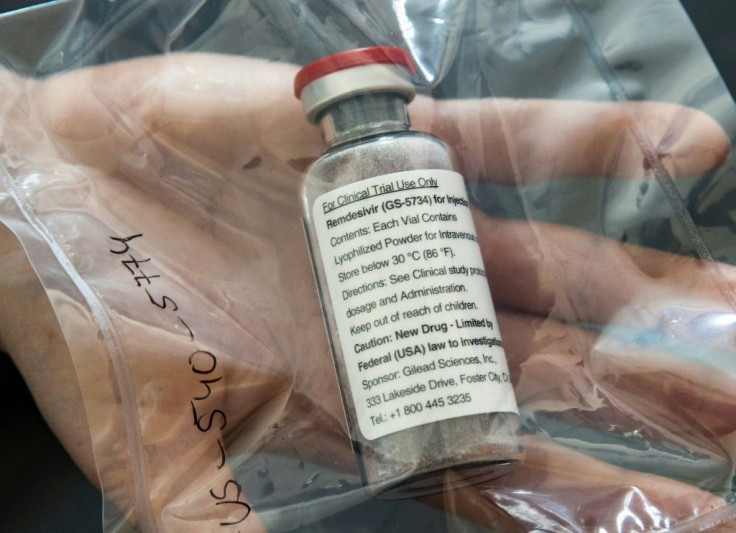Gilead Drug Shows Promising Results In Treating COVID, Ready For Distribution Says CEO
KEY POINTS
- Gilead's coronavirus treatment redemsivir was found to reduce recovery time in patients by several days
- Redemsivir and other drug treatments could serve as stopgap measures until a proper vaccine is ready and approved
- The Trump administration and Congress re-entered negotiations about a stimulus package to help a U.S. economy hit hard by the pandemic
Final results from Gilead Sciences' latest remdesivir trial showed the antiviral drug was effective in treating coronavirus patients and cutting recovery time by at least a week.
Gilead’s CEO said, given the positive results, the company was ready for mass production and distribution of the drug.
As of Friday, Johns Hopkins said the U.S. has over 7.6 million confirmed cases of coronavirus and 212,805 reported deaths from it. The latest trial was conducted for nearly a month and involved over 1,062 patients hospitalized for coronavirus. Half of the patients were given remdesivir while the other half were given placebo as part of the randomized, double-blind trial. Trial sites were located in the U.S., United Kingdom, Denmark, Mexico, Japan, Germany, Greece, Korea, Spain, and Singapore.
Average recovery time for people given remdesivir was found to be shortened by five days. While overall data showed the drug was not significant in reducing mortality, it appeared effective in lowering the mortality rate among patients on oxygen.
“Our data show that remdesivir was superior to placebo in shortening the time to recovery in adults who were hospitalized with COVID-19 and had evidence of lower respiratory tract infection,” the final report in the New England Journal of Medicine said.
Gilead CEO Daniel O’Day said the company was pleased with the results and ready for distribution, if and when the drug is approved.
“These results are meaningful,” O’Day told CNBC. “They’ll definitely help patients around the world who have the misfortune of entering the hospital to get better, and I’m really pleased to say that we have ample supply.”
Former Food and Drug Administration Commissioner Dr. Scott Gottlieb said while remdesivir, alone, is likely not enough to treat coronavirus, this data is a good sign in battling the pandemic.
“I think combined with the antibody drugs, which should be coming onto the market soon based on the data that we’ve seen, this is a pretty effective treatment regime in advance of a vaccine,” Gottlieb told CNBC.
While a drug like remdesivir, or the antibody treatment developed by Eli Lilly, serve as a stopgap means of addressing coronavirus, a vaccine will still be needed to serve as a long-term answer. The hope is that a vaccine will be approved and ready for distribution by the end of December, with timetables having life get back to some degree of normalcy by summer 2021.
Some of the vaccines furthest along include:
- Moderna and the National Institute of Health’s mRNA vaccine, currently in Phase 3 trials
- China’s CanSino Biologics and Russia’s Gamaleya Research Institute have vaccines in limited approval, though experts warned these were likely rushed and could still be harmful
- AstraZeneca and the University of Oxford’s potential adenovirus vaccine is in Phase 3 trials
“If you’re asking me when is it going to be generally available to the American public so we can begin to take advantage of vaccine to get back to our regular life, I think we’re probably looking at ... late second quarter, third quarter 2021,” Centers for Disease Control and Prevention Director Robert Redfield told the U.S. Senate during a Sept. 16 hearing.
However, there are serious concerns about the state of the U.S. economy if a vaccine isn’t ready for distribution by December. This is exacerbated by the recent divides between the Trump administration and Congressional Democrats over another possible relief package. Negotiations reached an impasse over the summer as neither side could compromise on a new deal and March’s CARES Act was allowed to expire on July 31 with no replacement plan.
By July, over 73,000 small businesses were forced to shut down completely thanks in large part to the economic impact of the pandemic. Large corporations were also forced to place large numbers of workers on furlough or let them go, completely, amid the coronavirus pandemic.
Relief talks resumed in September as Democrats, led by House Speaker Nancy Pelosi, started pushing a revised version of the HEROES Act that covered most of the same ground as the CARES Act. President Donald Trump attempted to halt relief talks until after the November general elections, but backed off shortly after and asked for individual relief bills instead of a wide-reaching bill.

© Copyright IBTimes 2024. All rights reserved.





















